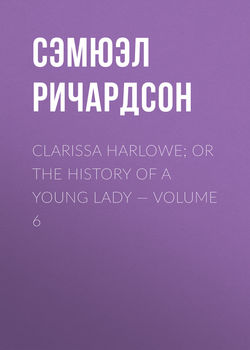Читать книгу Clarissa Harlowe; or the history of a young lady — Volume 6 - Сэмюэл Ричардсон - Страница 14
LETTER XIV MR. LOVELACE, TO JOHN BELFORD, ESQ. THURSDAY, JUNE 15
ОглавлениеLet me alone, you great dog, you!—let me alone!—have I heard a lesser boy, his coward arms held over his head and face, say to a bigger, who was pommeling him, for having run away with his apple, his orange, or his ginger-bread.
So say I to thee, on occasion of thy severity to thy poor friend, who, as thou ownest, has furnished thee (ungenerous as thou art!) with the weapons thou brandishest so fearfully against him.—And to what purpose, when the mischief is done? when, of consequence, the affair is irretrievable? and when a CLARISSA could not move me?
Well, but, after all, I must own, that there is something very singular in this lady's case: and, at times, I cannot help regretting that ever I attempted her; since not one power either of body or soul could be moved in my favour; and since, to use the expression of the philosopher, on a much graver occasion, there is no difference to be found between the skull of King Philip and that of another man.
But people's extravagant notions of things alter not facts, Belford: and, when all's done, Miss Clarissa Harlowe has but run the fate of a thousand others of her sex—only that they did not set such a romantic value upon what they call their honour; that's all.
And yet I will allow thee this—that if a person sets a high value upon any thing, be it ever such a trifle in itself, or in the eye of others, the robbing of that person of it is not a trifle to him. Take the matter in this light, I own I have done wrong, great wrong, to this admirable creature.
But have I not known twenty and twenty of the sex, who have seemed to carry their notions of virtue high; yet, when brought to the test, have abated of their severity? And how should we be convinced that any of them are proof till they are tried?
A thousand times have I said, that I never yet met with such a woman as this. If I had, I hardly ever should have attempted Miss Clarissa Harlowe. Hitherto she is all angel: and was not that the point which at setting out I proposed to try?15 And was not cohabitation ever my darling view? And am I not now, at last, in the high road to it?—It is true, that I have nothing to boast of as to her will. The very contrary. But now are we come to the test, whether she cannot be brought to make the best of an irreparable evil. If she exclaim, [she has reason to exclaim, and I will sit down with patience by the hour together to hear her exclamations, till she is tired of them,] she will then descend to expostulation perhaps: expostulation will give me hope: expostulation will show that she hates me not. And, if she hate me not, she will forgive: and, if she now forgive, then will all be over; and she will be mine upon my own terms: and it shall then be the whole study of my future life to make her happy.
So, Belford, thou seest that I have journeyed on to this stage [indeed, through infinite mazes, and as infinite remorses] with one determined point in view from the first. To thy urgent supplication then, that I will do her grateful justice by marriage, let me answer in Matt. Prior's two lines on his hoped-for auditorship; as put into the mouths of his St. John and Harley;
—-Let that be done, which Matt. doth say.
YEA, quoth the Earl—BUT NOT TO-DAY.
Thou seest, Jack, that I make no resolutions, however, against doing her, one time or other, the wished-for justice, even were I to succeed in my principal view, cohabitation. And of this I do assure thee, that, if I ever marry, it must, it shall be Miss Clarissa Harlowe.—Nor is her honour at all impaired with me, by what she has so far suffered: but the contrary. She must only take care that, if she be at last brought to forgive me, she show me that her Lovelace is the only man on earth whom she could have forgiven on the like occasion.
But ah, Jack! what, in the mean time, shall I do with this admirable creature? At present—[I am loth to say it—but, at present] she is quite stupified.
I had rather, methinks, she should have retained all her active powers, though I had suffered by her nails and her teeth, than that she should be sunk into such a state of absolute—insensibility (shall I call it?) as she has been in every since Tuesday morning. Yet, as she begins a little to revive, and now-and-then to call names, and to exclaim, I dread almost to engage with the anguish of a spirit that owes its extraordinary agitations to a niceness that has no example either in ancient or modern story. For, after all, what is there in her case that should stupify such a glowing, such a blooming charmer?—Excess of grief, excess of terror, have made a person's hair stand on end, and even (as we have read) changed the colour of it. But that it should so stupify, as to make a person, at times, insensible to those imaginary wrongs, which would raise others from stupifaction, is very surprising!
15
See Vol. III. Letter XVIII.
